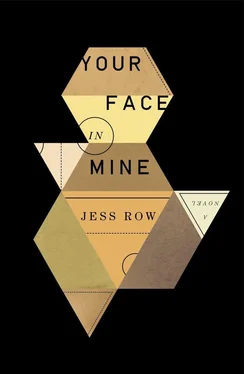The room — which was dark when I came in, past midnight, and I tumbled into bed without even turning on the bedside lamp — is much bigger than I imagined. The bedroom opens into an alcove with a writing table and a couch, and the look is Thai Resort Classic, even I can see that, all teak and rattan and silk, lustrous green-and-gold scarves hung on the walls, a pair of brass kneeling monks on the coffee table, an antique-looking map labeled SIAM over my bed. Thorough, expensive, and generic: too perfect, like a stage set for one of those reality TV shows where I’m a strapping nitwit from Des Moines, a doe-eyed dental hygienist from Wilkes-Barre. On the writing table, in a square glass vase, a bouquet of orchids, of course, bound up with pencil-thin shoots of yellow bamboo. The room smells of incense and also something drier, more chemical: wood polish. Antiseptic. Pledge, Dettol, Febreze. Someone has put a lot of time into this, I’m thinking, a room that says, you are having an experience. You are getting what you paid for. Without demanding of you anything at all.
Someone downstairs — the birds have died down for a minute — is speaking Japanese.
It’s been years, and I hardly studied it conversationally, mostly just scholarly Japanese, the stock language of articles on Asian literature and linguistics, but I can pick out a few words, here and there, the shape and direction of the sentences. Of course we pay for… the airport… no visa requirements… full private bath. Yaha. Yes, Yaha. What does Yaha mean? I wonder. I will mail you the brochure! he says, whoever it is, speaking formally, as to a client, a customer. Call me back! I can almost hear the bow. In Japanese, even speaking on the phone, you bow.
A secretary, I’m thinking. An assistant of some kind. Maybe, from the sound of it, a separate business on the side. Nothing unusual about that. Just that Martin didn’t mention it. But who thinks of everything? In a place this size, would I expect to be all alone?
The house belongs to him. I’m remembering this now. How, in the car, pulling through the gate, Martin couldn’t resist a proprietary smile. You get sick of staying in hotels, he said. No matter how nice they are. And in any case I have business interests. Makes sense to maintain a presence. An address. I let clients stay here sometimes. These perks, you know, in the business world, sometimes that’s all that matters. People are shallow. Sometimes all they want is a gesture.
It’s a pretty elaborate gesture, I might have said, though just to make an obvious point.
Now I’m up and moving around, feeling a hollow cramp of morning hunger, postflight hunger. My laptop bag is on the writing table, untouched. My suitcase stands to one side in the bathroom, or dressing room, since it has mirrors, a chest of drawers, a pressing stand. Empty. Someone came and put my clothes away while I was sleeping, and added a bathrobe, a set of blue silk pajamas still in their plastic wrapper, a pair of plastic flip-flops and a pair of leather thongs, and, as I see when I open the closet, an off-white linen suit, more or less my size. Or, when I slip on the jacket, almost exactly my size, the cuffs only an inch too long. What is this, I want to say to Martin, Fantasy Island? Or callbacks for a Tennessee Williams play?
On the other hand, it’s a pretty nice suit.
I need coffee. Coffee, a few words with Martin, a plan for the day. I shrug the jacket off, leave it hanging on the doorknob, choose what seems to be the most neutral outfit, a black polo shirt and jeans, and slip out the door, in my stiff new sandals, into the blue-tiled hallway, open to the outside, with tall arched windows at both ends, and down the stairs, only dimly remembering where to go. When we arrived last night the house was dark, floating in a constant hum of crickets or katydids, and there was only Phran to greet us, a short, stocky man, very brown, in a blue sarong and a Dallas Mavericks T-shirt, who carried all our suitcases upstairs at once. Now I come into a kind of central gallery, a breezeway, done in the same blue tiles, and, following a smell of coffee, flowers, and overripe fruit, into a large, open kitchen, or kitchen/office. At the kitchen end a woman in a blue smock dices vegetables with a cleaver, her face covered with a surgical mask; at the other end, along one wall, sits a bank of three computer screens, and a short, slender black man in front of them, his dreadlocks done up in a knot atop his head, tapping a pen on the desk and speaking, into a headset mic, in the voice I heard upstairs: perfect, unhesitating, native Japanese.
And so on instinct, as travelers do, as scholars do, as a matter of habit and protocol, when he says sayonara odeshka and turns to me, with a broad, bloodshot smile, I say, in Japanese, good morning, I am Kelly Thorndike, may I have the honor of your name?
God! he says. You startled I. Sorry. Pleased to meet you.
His English has an overloud, exclamatory, gummy quality to it; it takes me a minute, as if two frames of a photograph have to be overlaid, and then I realize he’s speaking with a Jamaican accent, a kind of effortful, labored accent, like Philip Michael Thomas on Miami Vice . I’m Tariko, he says. The office boy. Head Web lackey and secretary of all things Orchid. Did Martin tell you who I am? Your Japanese is not bad!
I feel, for some reason, the urge to wring my hands, and simultaneously the need to sit down; inside and outside my body, the world for a moment has the consistency and smell of melting candle wax. Behind me I hear the skitch-skitch-skitch of plastic sandals, and the woman in the surgical mask appears, carrying a plate of three croissants and a cup of something dark and milky. Sit down, please, she says, and gestures to a small side table. Helpless, boneless, I follow her, and when she pauses for a moment before leaving, I take a bite of croissant and chew it with my eyes closed, trying to remember what a croissant is supposed to taste like.
Tariko, I say, finally, which are you?
Which am I what?
Which were you, to begin with?
Oh! That. Should have introduced I properly. I’m transitioning, of course. Originally Tariko Ogawa, from Kanazawa, Fukui Prefecture, and in six months, Ras Leon Coxholden, from Spanish Town. I’m the first. The first Japanese, that is. To go all the way.
Well, I say, it’s very convincing. And then, in Japanese: When I heard you upstairs, you sounded completely Japanese. When I came down here, you looked like a Jamaican. No doubt at all.
Dr. Silpa is a miracle worker. By Jah’s grace.
Would you prefer it if I spoke only English?
If you don’t mind. I have to use Japanese on the computer, of course. Talking to potential clients. And brethren. But otherwise I try to stay with English. Part of my process.
Are there Japanese Rastafarians?
Of course, Japanese Rastas! I’m second generation. He reaches over to the table and flips open a thin wallet and shows me a much-creased, laminated picture. Bob Marley, in his late stage, raccoon-eyed, slack-jawed, his dreadlocks thick and tumescent, shaking hands with a tiny grinning shaggy-haired Japanese man in a tie-dye T-shirt. My dad ran the first Reggae Sunsplash. Nineteen seventy-eight, he says. Took the first Japanese pilgrimage to Ethiopia. No, I’m dread as they come. One hundred percent Nyabinghi, I-tal from birth. So it’s natural, for me. This project. This journey .
His smile has a certain infectious warmth; it exudes contentment, confidence, ease. Why make it so hard? that smile says. The mark of a natural salesman. He could sell junk bonds, burglar alarms, time-shares, used cars, Mormonism. Whatever it is, I’d think about it for an extra moment. I’d be tempted.
Читать дальше












